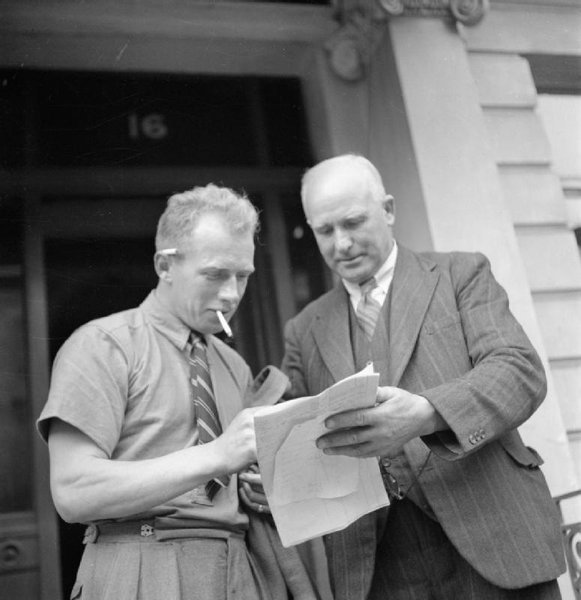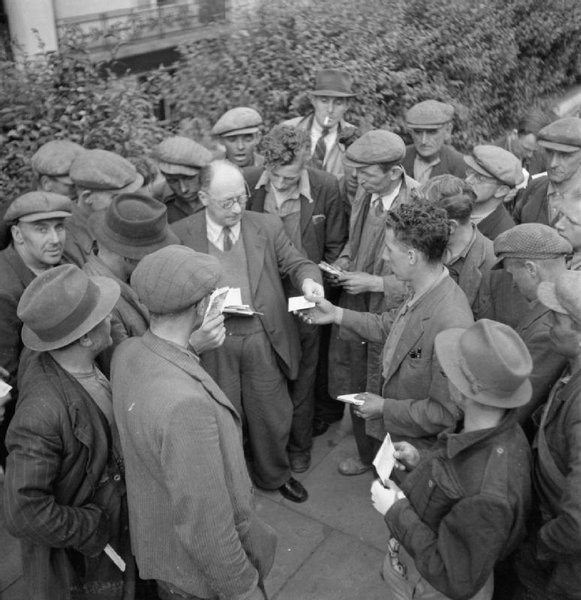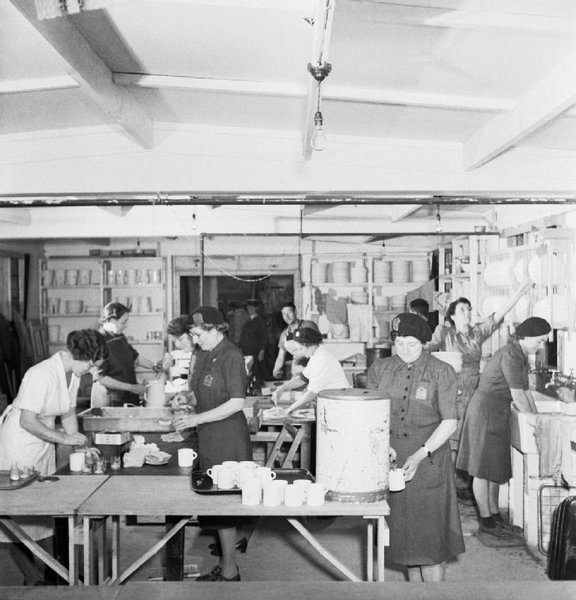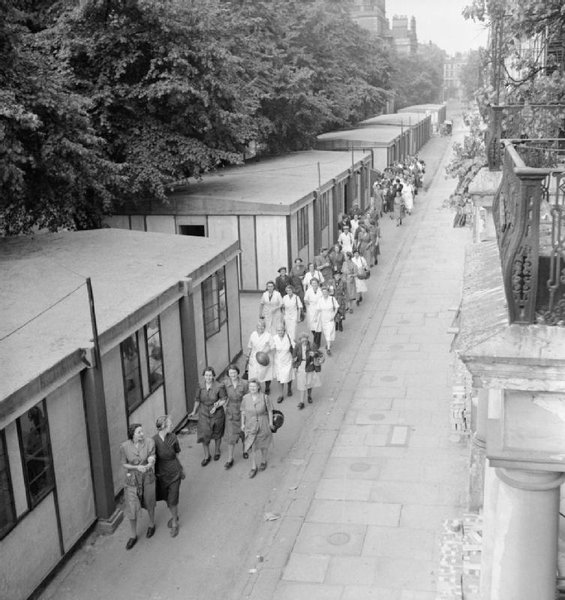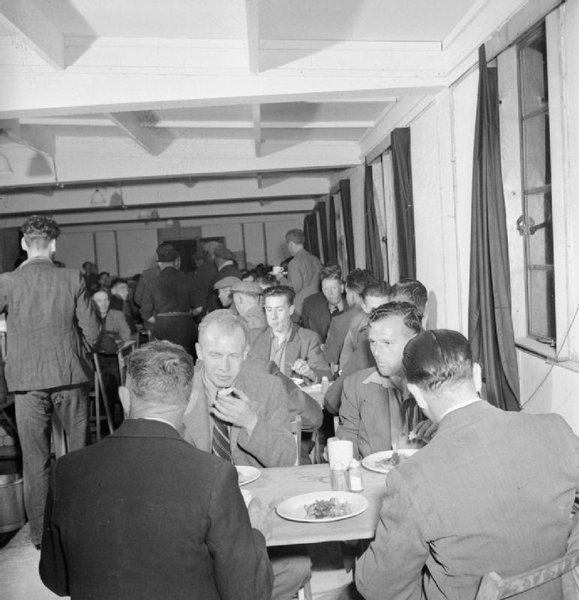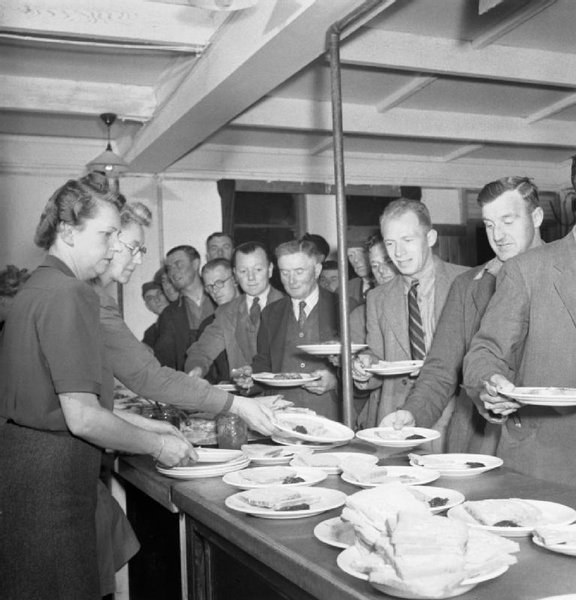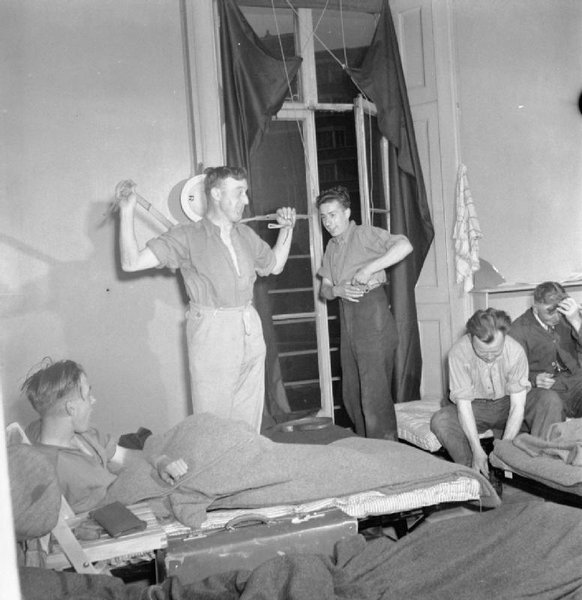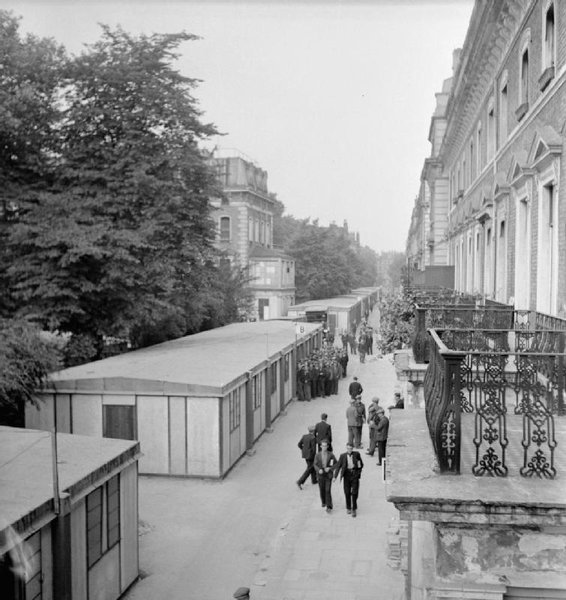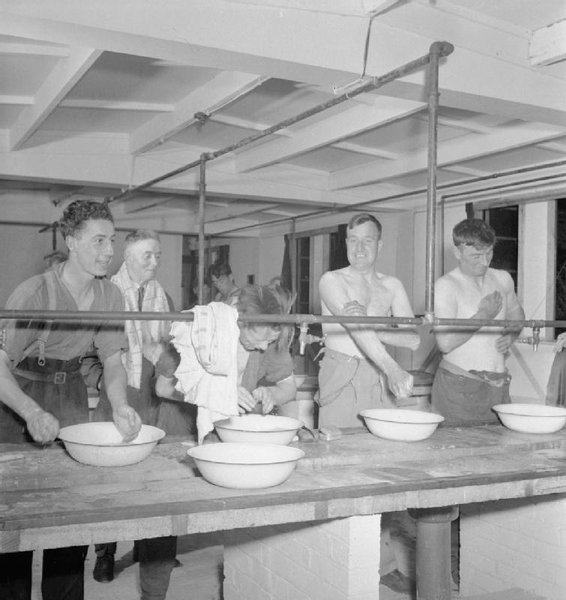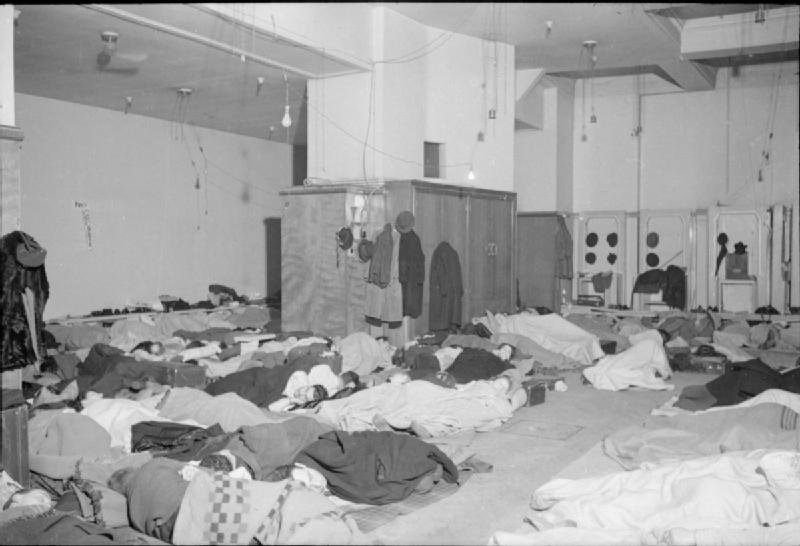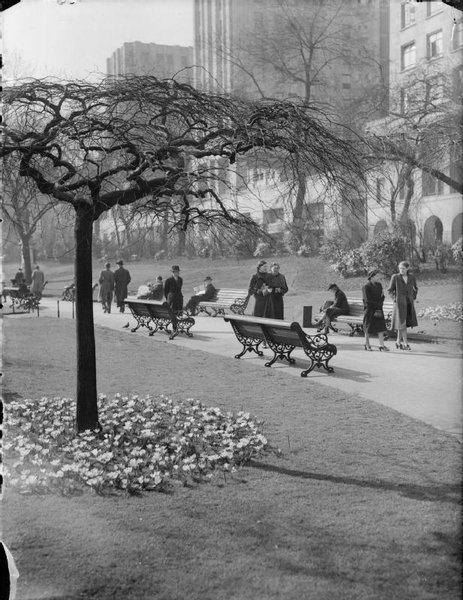High Explosive Bomb at Queen's Gate
Description
High Explosive Bomb :
Source: Aggregate Night Time Bomb Census 7th October 1940 to 6 June 1941
Fell between Oct. 7, 1940 and June 6, 1941
Present-day address
Queen's Gate, South Kensington, Royal Borough of Kensington and Chelsea, SW7 3EX, London
Further details
56 18 NW - comment:
Nearby Memories
Read people's stories relating to this area:
Contributed originally by Stephen Bourne (BBC WW2 People's War)
My Aunt Esther was a black working-class Londoner, born before World War 1. Her life spanned almost the entire century (1912 to 1994).
Her father, Joseph Bruce, settled in Fulham, west London, during the Edwardian era when very few black people lived in Britain. He came here from British Guiana (now Guyana) a colony in South America. He was a proud, independent man.
Aunt Esther left school at 14 to work as a seamstress and in the 1930s she made dresses for the popular black American singer Elisabeth Welch. After Joseph was killed during an air raid in 1941, Aunt Esther was 'adopted' by my (white) great-grandmother, Granny Johnson, a mother figure in their community.
Esther said, 'She was like a mother to me. She was an angel.' For the next 11 years Aunt Esther shared her life with Granny (who died in 1952) and became part of our family.
During World War 2, Aunt Esther worked as a cleaner and fire watcher in Brompton Hospital. She helped unite her community during the Blitz and having relatives in Guyana proved useful when food was rationed.
She said, 'Times were hard during the war. Food was rationed. Things were so bad they started selling whale meat, but I wouldn't eat it. I didn't like the look of it. We made a joke about it, singing Vera Lynn's song We'll Meet Again with new words, "Whale meat again!" Often Granny said, "We could do with this. We could do with that." So I wrote to my dad's brother in Guyana. I asked him to send us some food. Two weeks later a great big box arrived, full of food! So I wrote more lists and sent them to my uncle. We welcomed those food parcels.'
In 1944 the Germans sent doodlebugs over. Said Aunt Esther, 'When the engine stopped I wondered where it was going to drop. It was really frightening because they killed thousands of people. A doodlebug flattened some of the houses in our street. Luckily our house was alright, even though we lived at number thirteen!'
In the late 1980s I began interviewing Aunt Esther and in the course of many interviews I uncovered a fascinating life history spanning eight decades. Aunt Esther gave me first-hand accounts of what life was like for a black Londoner throughout the 20th century. A friendly, outgoing woman, my aunt integrated easily into the multicultural society of post-war Britain. In 1991 we published her autobiography, Aunt Esther's Story, and this gave her a sense of achievement and pride towards the end of her life. She died in 1994 and, following her cremation, my mother and I scattered her ashes on her parents' unmarked grave in Fulham Palace Road cemetery. Granny Johnson rests nearby.
Contributed originally by ageconcernbradford (BBC WW2 People's War)
This story was submitted to the People`s War site by Alan Magson of Age Concern Bradford and District on behalf of Malcolm Waters and has been added to the site with his permission. The author fully understands the site`s terms and conditions.
The war against Germany was declared in 1939.
My parents had already separated, fortunate for me I stayed with my Father and my Sister Nora went with Mum.
Nora was really my half sister 6 years my senior yet I never looked on her other than my whole sister.
Nora’s name was Robinson, my Mother’s maiden name. Nora eventually left home to join a circus.
Dad, an ex regular soldier, who served with the Northumberland Fusiliers in the first world war, there was very little he could not put his hands to. He baked all our bread, a brilliant gardener, was a very good cook and kept our home spic and span.
Sadly he rarely talked about his life so I really never found out much about him. I know he was a Geordie and had a brother Billy, but what part of Newcastle I have no idea.
End of January 1940 was a very bad winter. Dad jumped off the running board of a bus, slipped and struck his head on the kerb. He had a stroke and died on the 10th February in St Johns Hospital, Keighley.
Going down Airwarth Street my Uncle Joe told me my Dad was dead. His last words were the start of my Christian name MAL then he passed on. I must emphasise the point my Dad was a brick, he lived for me. I did cry at night when I was alone, realising I would never see or hear his face or voice again.
My life changed so much that at times I lived with my schoolmate Ken Smith, we both worked in Edmondson`s Mill, Keighley as doffers. The foreman threw a bobbin at me as I was sat on a bobbin box and I threw as many back at him and got the sack.` I left to work in a steel works shovelling steel into a foundry, then I did some lumber jacking at Oakworth, Keighley. I ended up at Doublestones Farm in service above Silsden for the Fothergills. I spent six months from 5am until 11pm at night building walls, shearing sheep, dipping sheep, harnessing the horse, burying dead sheep, milking the cows, feeding and mucking out.
Keighley was normal, one hardly knew a war was on, working on a farm was even more remote. After six months farming, I asked Fothergill, can I go to Keighley Fair on Saturday afternoon. He said, “what am I going to do without you”. So I went to the fair and never returned to farming.
Mum and I went to London after the Blitz, even then night and day bombing was daily. You could hear the distinctive drone of Jerry as they gradually got nearer and the bombs got nearer. When we arrived in Fulham we had no money, looking for a Mrs Quinn who had left her flat leaving no forwarding address so Mum and I went knocking on doors until a Mrs Lampkin put us up. Mum was probably desperate having no money and no job. I must have been a burden to her.
I went to school at Ackmar Road with some of Mrs Lampkin’s boys. I adapted to life quickly and made the best of it. Mum then decided London was too dangerous, so she sent me to Ponterdawee South Wales as an evacuee. I well remember saying good bye to Mum stood on Paddington Station with my overcoat on, a label with my name and destination, my gas mask, identity card, ration books and teachers who were taking care of us. We arrived at night time in a schoolroom in Ponterdawee where our names were called out, a person stepped forward and took my hand a man and his son were my carers. I cannot remember their names, but his son was about my age so he taught me the ways of the Welsh. I quickly adapted getting free coal from the slag heaps. Taking the cows to the bull and getting diced cheese with brown sauce. I enjoyed my stay in Wales. I was treated very well.
Mum had established herself in Fulham she had a flat, then Nora came back into our lives again. She had blossomed into a bonny young woman who looked after me. At Ackmar Road schoolboys used to play pitch and toss, this was new to me as in Yorkshire gambling was not even on the cards. I can remember on Christmas going out singing carols to get Mum a Christmas card. She cried.
Nightly, the sirens went the whole sky was lit up with searchlights, I got fed up with getting out of bed. When Nora shouted of me to go down into the basement I said okay, you go on, I’ll follow you.
I could hear the bombers getting nearer and nearer, still lying in bed. Then I heard a whistling bomb that landed too close for comfort, my first reaction was to dive under the bed, my next reaction was to get down them stairs post haste. Nora was stood looking out of the back window, we were surrounded by buildings on fire. We were transfixed in awe at the blazing buildings, fire engine bells ringing, police cars whistles blowing, but we soon shot into the basement. Mum was on night work but the old lady always made us welcome. It got so bad at times we went to sleep on Piccadilly Station 75 feet below ground. Nora joined the ATS, I saw very little of her till later in life. One of the most frightening experiences was the mobile, ack ack guns that went off right outside our front door shaking all the windows. Most houses had stirrup pumps and buckets of sand just in case an incendiary came close.
Mum remarried a Peter Johnston from Tipperary In Ireland, he was an RSM in the Royal Engineers. He always respected me and was a real good family man, he always brought something home for me, but I am really a loyalist. I loved my own Father so much I could not accept another Dad, sad in a way, because he was a father of eight children who went in the Children’s Home in Keighley. They were all good children who’s mother fell down the stairs and broke her neck. Mum and I went to live in Townhead Glasgow to be near Peter who was stationed in Inverary. I went to school in Townhead I joined the Boys Brigade and was also a Lather Boy in a Barbers Shop. We got a bus from Robertson Street to Inverary went up the Rest and be thankful to arrive to see some real military movement. Assault craft, vehicles running backwards and forwards obviously getting ready to go to Dieppe. I slept in a huge bell tent while Mum and Peter went off to a Hotel. Peter was a very musical man he ran the Isle of Capri Band up Woodhouse, Keighley, an accordion and kazoo band who were very very good, they won many cups and shields, parading them around the Wood house Estate (pre War)
Back in London again in OngarRoad, Mum had a flat. Peter committed bigamy so Mum was on her own again. I remember going back to Keighley to spend my last days at Holycroft Board School, then back to London again. I got a job with the Civil Defence at Chelsea Town Hall and joined the London Irish Rifles Cadet Corps at Chelsea Barracks as a cadet soldier. As a messenger boy in the Civil Defence I cycled round the streets in uniform and my steel helmet on to various people of notoriety including the Chelsea Pensioners. Mum got a job in Peterborough looking after a man and his son, again his son was around my age, he was a brilliant young artist. He drew Peterborough Cathedral very professional. One day I went to Yewsley right next to the American Fortress Base. Looking up in the sky I could see and recognise a Jerry plane diving straight toward the street I was in. I ran like hell resting behind an Oak tree in a church yard watching the plane strafing the main street with cannon shelling, a close call.
I also worked in Dubiliers factory at Acton, making gallon petrol cans and we listened to " Music While you Work ". I also in Grosvenor House,Park Lane as a paticia`s assistant and the Americans occupied the hotel in the war years.
While in the Civil Defence I saw vapour trails of V2 rockets that landed somewhere toward Westminster. I went to Romford one night to stay at Harry`s, my mate`s house, as usual the sirens went moaning Minnie. It was like watching a film show looking over London with the bombers dropping canisters full of incendiaries. I commented to Harry, someone is getting a pasting, I found out Fulham had been hit again, a friend of Mum’s showed me his burnt shoes caused by kicking an incendiary out of the house. Everywhere was devastation, doors burned, windows blown. One chap, playing the piano had an incendiary pass through the roof straight between him and the piano into the next floor. I went to Putney one day, as normal, sirens sounded, my bus stopped on Putney Bridge, coming up the Thames was a V1, a buzz bomb, I watched it from the top deck coming right above the bus. The engine stopped. I watched it glide into a block of flats at Barns Bridge. I had the windows open, I felt the blast on my face from approximately half a mile away. One day I saw a squadron of 13 V1’s passing overhead in Gloucester Road, South Kensington.
The Army used to train on Harden Moor leaving unexploded bombs lying around. Two of my schoolmates playing with an unexploded PIAT bomb were blown to pieces in Lund Park, Keighley. Another friend Alec Joinson tried to saw through a grenade detonator, his face and arms were pitted with splinters he was covered in Sal volatile and was partially deaf.
I was very very lucky boy to be here to tell my story, I picked up a pop bottle that looked like bad eggs, fortunate for me I did not have a bottle opener so I through the bottle into a quarry. You should have seen the bright yellow phosphorous I’d picked up a Molotov cocktail, a phosphorous bomb.
Nora, my Sister, was in an air raid shelter that was hit and became flooded. She developed pneumonia then consumption. She spent many years in hospital and despite doctors warnings she had two children. At 43 neglected by her husband, she died and was cremated in Norwood Crematorium. She was a very very good mother who wasted away to a living skeleton. She spent many months in Brompton Hospital, I made all the funeral arrangements, the husband pleaded ignorance. I always enjoyed going to see her in London when I returned to Keighley later in life. I loved Nora very dearly and she never complained about all she suffered. Tommy Junior and Jenny still live in London, at Herne Hill. I occasionally call to see them.
The spirit of the Londoners in those dark days was second to none. We sang on the stations. I sang on Keighley Station when Ken Smith’s Father in Full Service marching order was off to Dieppe. Everyone sang “ wish me luck as you wave me goodbye” and “for a while we must part but remember me sweetheart “. Vera Lynne, Ann Shelton, Tommy Trinder, Arthur Askey, Flanagan and Allen and the Crazy Gang all made for good entertainment. Not forgetting George Formby and Grace Fields.
I am now 76 years old. Today I doubt the law would look on a single man like my Dad and the Gentleman in Wales as being capable of taking care of a family.
Contributed originally by Mike Hazell (BBC WW2 People's War)
CHAPTER SEVEN
GREEN LINES
By 1956 I was offered the chance to work on the Green Lines and I was in seventh heaven. No more running up and down stairs, the Green Lines were all single deck RF coaches then, and no more rushing to get fares in either. People only used the coaches to do longer journeys because the minimum fare was high in relation to the bus fares and with plenty of buses on the road; no-one caught a coach for short journeys. So the job was easier and the pay slightly higher, no wonder there was a waiting list to work on Green Lines. Your name didn’t even get on the list if you had a bad record so coach crews did tend to consider themselves just a wee bit superior to bus workers although we, at Staines, never soared to the dizzy heights as at Windsor Garage where a whole row of tables alongside the windows and radiators were reserved for coach crews while bus crews were expected to sit over the other side which was cold and draughty in winter and stifling hot in summer!
The regular passengers using Green Line coaches were different too — not better, just different. The rush hours tended to begin later, being comprised mostly of people working in offices and West End shops, business people, managers, stock brokers and the self employed. Many belonged to what we would call “the bowler hat brigade”, hailing the coach with a raised umbrella or dispatch case. We had one driver who loathed being waved to in this manner and his conductor got fed up with the driver moaning about it too. So, one day at a request stop in Knightsbridge, they slowed up to the unsuspecting gentleman holding out his copy of “The Times”, the conductor put out his hand, took the newspaper and the coach sped on its way leaving the city gent fuming on the pavement. Not that it was always easy to guess a man’s occupation by his manner of dress. One of my favourite passengers looked like a stoke broker, always carrying a smart, black dispatch case. He travelled regularly to Town for years till one day he opened his case and showed me the contents; several tobacco tins full of coloured chalks and a large homely packet of sandwiches. He was a pavement artist who had earned an income high enough to enable him to live in the “stock broker belt” and travel up to his pitch every day. His neighbours believed him to be a solicitor — which I suppose he was in a way.
I preferred the 701/702 roads best. There was so much to see going through London every day and more interesting characters among the passengers too. All the regular crews got to know the actor who lived in Bedfont — he always played a “heavy” with a mid-European accent and had a very good line in sly leers. I wouldn’t be surprised if he originated that well worn phrase, “Ve haf ways of makink you talk” because that was just the sort of character he usually portrayed. In actual fact he was a charming man and used to sit on the coach reading his script and I still smile, remembering the time a woman sitting across the aisle asked me whether he was “peculiar” because of the evil expressions that flitted across his face while he was reading! Not wishing to reveal his identity and subject him to the attentions of all the film fans on the coach I told her to sit on the back seat and I would keep an eye on him. He was recognised a couple of times while travelling home and I couldn’t help feeling sorry for him being obliged to sign autographs and answer dozens of questions when he so obviously wanted to study in peace. Another actor was starring in a series on the television and played the handsome, debonair hero forever rescuing the damsel in distress and engaging in fist fights while remaining cool as a cucumber. Sad to say, he was irritable, petulant and terrified if the driver tried to speed up a little in an attempt to keep to the timetable — the very last person I would want around in any kind of crisis. He must have been a very good actor, though — it never showed through on the screen.
The responsibility for time keeping on the road is shared between the driver and the conductor and it isn’t an easy job to keep the vehicle on time, especially through London. By the time we had been stuck in traffic jams through Chiswick, Hammersmith, Kensington, Knightsbridge, Hyde Park Corner and Victoria we were frequently up to an hour late and if the driver didn’t push the coach along through the rest of the journey we would arrive at Gravesend with only a few minutes of our meal relief left. Union rules and police regulations dictate that a driver must have at least thirty minutes away from the driving seat which meant that a late arrival at Gravesend resulted in a late departure on the return journey. You couldn't win a race against time like that and still do the job properly.
In contrast, the very early and late journeys would seem endless — we had to cruise along so slowly that the passengers would sometimes get impatient and complain that we were deliberately running late. We used to hang about at compulsory stops, pull up to the side of the road at public toilets, engage a passenger in conversation as he or she was alighting -—anything to waste a few minutes that would prevent us arriving at a turning point early enough to be booked. We were allowed a leeway of two minutes and on Winter Sundays all the stops approaching Victoria would have a Green Line parked up, out of sight, losing time before arriving at Eccleston Bridge which was our London Terminus. The drivers used to curse the traffic lights at all hours of the day and night — they were always showing red when we were desperately trying to catch up lost time and green when we were anxious to lose it. For the most part the road inspectors were very understanding. They had almost invariably been drivers themselves earlier in their careers and knew how difficult it was to keep strictly to the timetable. Of course, drivers varied in their approach to the job and a few would deliberately run late so that they could claim overtime at the end of every day. The rate for all overtime has always been time and a half and a daily docket for an hour would amount to seven and a half extra hours pay every Friday.
For the most part, I have been very lucky with my regular drivers who did their best to run by the timetable. One such was Roy, a good, steady driver, conscientious, courteous and an excellent mate but the timing of the vehicle obsessed him to such an extent that he not only checked on our own progress every ten minutes along the road but also other Green Lines we met coming the other way. I thought his wife was joking when she told me she gave him a new leather strap for his pocket watch every Christmas but I subsequently discovered it was quite true, he pulled that watch from his top pocket so often in the course of a day’s work that the strap became quite ragged and worn by the following November. Dear Roy — I was sorry to lose him but I returned to work after my holiday one year to find that he had transferred to a vacant place on the coach rota. Another conductor told me later that Roy was worrying so much at my habit of signing on at the last moment that his fear of running late was threatening to give him a peptic ulcer. He retired some years ago and, presumably, he and his watch enjoy a well-earned rest.
Cliff, however, was a real maverick: transferred from Central Buses when he moved into the Staines area, he thought Country Buses were very slow and tame after the more hectic work in London’s traffic and was overjoyed when he was transferred to Green Lines and took Roy’s place on the rota. No two drivers could have been more different — working a journey through Town in the rush hours with Cliff became a cross between a tank assault course and a Cavalry charge. He really was an excellent driver who knew the length and width of those old RF coaches down to the last inch; he would slide through gaps in the traffic which didn’t look wide enough to allow the safe passage of a mini car and I swear there was often barely the width of a postage stamp between us and the rest of the traffic as we sailed through. He took short cuts through side streets, jumped traffic lights and we went two miles off route chasing a lorry whose driver had the temerity to “carve him up” at Hammersmith Broadway. The six months I spent with Cliff put years on me but, oddly enough, most of the regulars enjoyed riding with him. He could be curt, even downright rude, with those passengers who did not realise that he was doing his best to get them to their destinations on time and accused him of reckless driving or giving them an uncomfortable ride. But he had a very soft spot for the elderly and old ladies adored him as he was always at his most charming with them. Our friendship continued beyond working hours and Bill and I frequently went to his house for an evening of playing cards and the two men would talk “shop” while Cliff’s pretty, young wife and I served up refreshments and chatted about bus work too, but in relation to what ill effects it could have on family life.
With men and girls working together for eight hours every day and sometimes far into the night, there were bound to be some marital problems among the staff and Staines Garage was neither better nor worse than any other. With the cost of living and living standards themselves constantly rising, more and more wives started to go out to work, and this created a situation where working times of the two jobs clashed to such an extent that married couples spent very little time together; when a driver was on late turn his wife would get up and go off to her own job, often leaving him still in bed and having to cook his own meals before leaving for work himself in the early afternoon. By the time his duty had finished it might be midnight and his wife and children already fast asleep in bed. This state of affairs would result in a man seeing far more of his conductor than he did his own family, and when that conductor was a pretty, young girl the result was almost inevitable. Sometimes the outcome of such entanglements was tragic and at other times highly comical — at least from the viewpoint of those of us who watched the game from the sidelines as it were. Suspicious wives would lurk around the garage or take to riding on their husband’s buses in an attempt to ward off the opposition — and gossip was rife.
After Cliff left, to return to living and working in London again, I was approached by one driver who had been working with a jolly girl in her late teens and asked me if he could come and work with me instead. I was rather puzzled at the time as he and his former mate seemed to get on so well, but I knew he was a good driver and easy to get along with so I agreed. Within days he told me why he had decided to change rotas. Some dear, kind soul had told his wife that he was having an affair with his young conductor and his life at home had been hell ever since. It wasn’t very flattering to think that he had decided that working with me would solve his problems and I didn’t relish the prospect of coming to work to be confronted by an irate wife, but I did feel sorry for him and decided to give it a try. Unfortunately for me, I must be a perfect mother or sister figure for I found myself listening to many tales of various drivers’ private lives over the years — in fact one, who worked with me over a period of five years or more, frequently called me “Auntie Doris” and the name stuck. Perhaps I should feel flattered in a way after all?
In any case, I settled down with Harry quite easily — he was a happy-go-lucky man in his early fifties — already a proud grandfather and we both hoped that his change of conductor would have the desired effect on his home life. I never actually met his wife so presumably she must have received some pretty unflattering reports about my appearance and decided that I constituted no danger to her. For a few weeks all went well, Harry and I would chat about our children — his being a lot older than my own were at that time, about bus work — he had several years more service than I had too and we swapped stories about passengers and other crews and generally got on together quite well. Till the day came he put his name down for rest day working and found he had been given a duty with his former conductor.
I suppose a wiser man would have turned down the duty, but he had volunteered for rest day work because he needed the extra money and decided to do it anyway and say nothing to his wife. A few days later the storm broke and life became hell again. It was almost certainly another member of staff who stirred up the trouble by gossiping again and I can only hope that the result of his actions didn’t trouble his conscience too much. Deciding that life at home had become unbearable Harry finally left his family — there was a divorce and he returned to his former mate again and they eventually married. When she left to have a child I worked with Harry again for a few months. He was quite happy with his young wife but distressed that some of his children saw only his first wife’s side of the problem and cut themselves off from him altogether. Added to this was his fear that the age gap between himself and his second wife might cause her to be left with a young family if anything untoward happened to him. They had three children over the next few years and then his worst fears were realised and a series of heart attacks finally caused his death and his young family had a very lean time of it until the children left school and were able to go out to work. I met his widow only a few weeks ago and we chatted about old times — she misses Harry dreadfully and no one has taken his place yet.
Another romance that caused quite a stir in Staines Garage at the time involved a good looking young bachelor driver and a very attractive girl — a Staines conductor. Perhaps I should explain that bus and coach crews came into contact with several other garage canteens — including the Alder Valley canteen in High Wycombe, the Country Bus canteens at Windsor, Dartford and Northfleet and Central Bus canteens at Victoria and Thornton Heath. The driver fell in love with our young conductor when she used the canteen at his garage and decided to transfer to Staines to get to know her better. He was somewhat disconcerted to discover that she not only had several boy friends at our garage but ardent admirers in every other canteen we used. The atmosphere grew rather tense for some months and rumour had it that not a few fights broke out between the newcomer and the locals till the lass finally solved the problem by transferring to Northfleet and marrying a driver down there. The rivals became the best of friends and peace reigned in Staines once again.
Other romances blossomed and died over the years, few culminating in weddings between crewmembers, but one wife in particular solved her marital problem in a very neat way. She told her driver husband that she had got a new job and duly left home every morning at 7.30 a.m. arriving home again around 6.30 each evening. This went on for a couple of weeks until the day came when she arrived at the garage in uniform and reported for duty. I wasn’t around in the garage that day but I’d love to have seen the expression on his face when she walked into the canteen while he was having a cup of tea with the object of his affections. To cap it all, it has always been the policy of the Transport Board to put married couples on the same duties unless specifically requested otherwise: the husband decided that discretion was the better part of valour and accepted the inevitable. Within a few days they were acting like a couple of turtle doves — he was so proud of her strategy that he was the one who would tell newcomers about it. They stayed at the garage together for several years before leaving the job when they moved out of the district.
Contributed originally by John E. Forbat (BBC WW2 People's War)
As air raids seemed to be declining after three years of evacuation, it was agreed that I should go back home to London permanently - as it turned out, just in time for a resumption of regular night raids.
Now aged fourteen and no longer so puny, I obtained the steel helmet and Fire Guard armband that was obligatory for Fire Guards in the six-storey block of flats where we now lived. This involved patrolling the corridors to check for incendiary bombs and more interestingly, standing on the flat roof above the sixth floor, to watch the search lights pick out bombers and to see the anti aircraft shells bursting. Regular training and practice in the art of extinguishing incendiary bombs with the piddling jet from a stirrup pump in a bucket of water, taught us to crawl below the smoke and to direct the jet, holding the hose over our heads while another pumped, till the bucket was empty.
I was ready to go to bed one evening some hours before my watch duty time, when a raid was going ding dong, as I looked out to the North, with the black out curtains behind me. A stick of bombs started whistling towards us, each a little nearer and when the whistling reached shrieking level, I ducked back behind the curtain. The bomb fell a short distance away and the window I had been looking through shredded the curtain near my stomach. Soon the Chief of our Fireguard section was ringing our doorbell.
"John, take this pink form to the Auxiliary Fire Station at Beaufort Street School and tell them we need them to put out a fire on the corner of Gliddon Road. We already pulled an old lady out - except she insisted on going back for her false teeth. Be quick now."
By now having my own bike, earned by tilling Uncle Eugene's allotment for a shilling a day, I donned my "tin hat" and clutching the pink form, sped the half mile along North End Road, over never ending broken glass. When I arrived, the school itself was well alight and I was told to go back - they were busy putting out their own fire. I made the return ride over the glass, somehow without the tyres going flat and the fire in Gliddon Road just continued to burn.
I was sometimes late for school. Everybody was sometimes and at assembly, after the Headmaster had announced who had been killed in the previous night's raid, the late boys were paraded for their punishment.
I must have been fifteen when the Doodlebug flying bombs began to rain down at all hours. One of the first passed right over our heads as my brother Andrew and I were cycling into Kent one Friday evening for one of our many weekend Scout camps. The A2 ran dead straight southeast and the throaty ramjet roared ever louder as it approached to fly right overhead. Flak was bursting all around it - quite a spectacular show - till the shrapnel started to bounce off the pavement around us and we ducked into a doorway, later burning our fingers on the hot shards.
On the way home on Sunday, we passed the Streatham house of a good friend who was old enough to have been called up for Service. Their front door was missing and all their windows were blown in, so Mrs Randall asked us to go to her sister who lived near us in London, to tell her they were OK. We got back onto our bikes and passed the cause of the Randalls' damage - a whole block of houses flattened by a single Doodlebug, leaving little more than a big crater. We cycled on past our flats towards the Randalls' relatives in Hammersmith and racing south as the sirens wailed, we heard another throaty roar rapidly approaching. We had been trained to lie down in the gutter with our hands covering our heads and to wait until the engine cut. The Doodlebugs then pitched down to dive onto wherever they were pointing. It cut out very close to us, so we dived for the kerb and waited.
A great mushroom cloud rose where it had hit in the next street and we got back up. Before we could pass on the Randalls' message, Andrew who had started medical school by then tarried to render First Aid.
In the months while the Doodlebug campaign persisted, the air raid sirens sounded just about every few minutes, it seemed. Most people dived into air raid shelters - often down into the Underground, where at night many slept on the platforms. But as many Doodlebugs came during the day as at night and while our flats had a big basement that was used as a shelter, we boys only used it to practice our table tennis, while it was otherwise unused. As Mother found out only after the War was over, being up on the roof was more exciting during air raids.
The frequency of air raid warnings got so high, that taking heed would completely prevent all normal activity and for the first time in my school days, I determined never to be late. No way was I going to let Hitler dominate my life any longer! Air raid warning or not, I rode to Sloane School and thumbing my nose at Hitler, arrived on time without fail every day. When the V2 rockets began to fall, there was no warning and no way to hide anyway. Once you heard the explosion - followed by the whine of its supersonic arrival, it was obvious that some other poor bastard had bought it.
If only I could be a couple of years older - I would have given my right arm to fly a Spitfire like some of my brother's friends.
Contributed originally by People of the Nothe Fort and Weymouth Museum (BBC WW2 People's War)
ENGLAND
1939 FRANCE AND HOME
Together with my Mother, Sister and one set of Grandparents, I went to Aix-Les -Bains, near Lyons, Southern France for my Summer holidays. I was aware of the rumours of war. In fact I was fascinated by seeing French soldiers with their first war uniforms of grey, old rifles and horse drawn field guns moving up to the Magino line. I had my tenth birthday out there.
As the war approached, my mother and Grandparents became worried, and decided to return to England. After some difficulty, they managed to book two sleepers and a bunk for me on the last train for Paris on the night of 1st September. I did not sleep very well that night as I was sharing a sleeper on the lower bunk, with a Frenchman who would not open the window and smoked smelly Sharrots all night.
We arrived in Paris early the next morning. We went to a hotel for breakfast then caught a train to Calais. We caught one of the last Cross Channel ferries to Folkestone that afternoon. On arrival we moved into a hotel at the top of the cliff overlooking the Channel. We stayed there until just before I was due to return to school. The next day, Sunday 2nd of September, we had just come out ofchurch as the Air raid alarm went off. Looking up we saw some big planes, coming over from France. Later we learnt it was a passenger plane bringing back holiday makers. Some thought the Germans were launching an attack against us.
SCHOOL
A few days later my mother took me to the school train in London to hand me over to the Head Master, Mr Venables. When she did this my mother told me that she was going in a few days to join my Father in India, where he was stationed with his Regiment, and so I would probably not see either of them until after the war and my holidays would be spent with my Grandparents. At this time my school was in Scarborough. In the first war a German U-Boat had shelled it and the Castle.
1940
Having spent the previous Christmas with my Grandparents in London and the "Blitz" having started my Grandparents decided I was safer at school for the holidays of the Spring term. My father had also been to this school as a boy and knew Mr Venables, and the "owner” Mrs Cooper. At this time the Army took a hand in events. They decided to take over the school as a training establishment. The result? I spent the whole of that holiday staying in a boarding house in Scarborough, with the freedom to go wherever I wanted, whilst the Headmaster supervised the clearing out of the school. He too stayed in the same place.
Just before the start of the Summer term the school moved to a village near Boroughbridge into a "Manor House". The Headmaster and I lived in a local pub, whilst the move was taking place. I spent most of my time doing things with people in the village, and going on cycle rides around the area. When the boys returned for the Summer term the numbers had dropped to about 30+.
One evening about midnight two of us spotted a torch apparently sending a morse signal into the sky at the time the air raid alarm had gone off. We took a note of the dots and dashes, and wrote them down. The next morning we told Mr. Venables and someone came to see us. We told him what happened and gave him the details in which he was very interested.
There had been rumours of spies in the area. The father of one of the boys was something to do with such matters. Later we heard that, down a dry "well" in a nearby derelict barn, a wireless, beds etc. had been found.
As this place was surrounded by aerodromes, the Germans attacked them on several occasions when we had to go to the air raid shelter. Most of my holidays from thereon were spent with my Great Uncle and Aunt at Kingsbridge in Devon.
1941
By the end of the Spring term, all the boys except myself had left the school, and it had become bankrupt but I was left on my own to be taught by the head master. There were several reasons why neither my parents or grandparents knew the situation. However, some of the last masters to leave took my Grandparents address and went to see them. One day whilst I was at lessons, there was a commotion at the front door. It was this master, who had returned with written authority to take me to my Grandparents, away from the school. The remaining staff, Mr Venables and members of the "Cooper" family, refused to allow him to do so. The master went to the Police in Boroughbridge. The matron, realising what was happening, started to pack up my clothes and a few oddments. About an hour later, the Police arrived at the front door and argued with the staff. Meanwhile the master had slipped in the back door, found me in the classroom, rushed me out to a taxi, and we went to the Police Station, without any of my clothes etc. When the Police Officers arrived back and heard this, they again went to the school and came back with these items.
The master and I then went by Taxi to York railway station, where we were taken aside by two detectives from York, who had been told by the Headmaster that the master was KIDNAPPING ME. The written authority was sufficient to convince them all was in order.
On our trip down to London the master had an Epileptic fit. I was scared out of my wits. Luckily an army Medic took charge, who was in the cabin with us. The master recovered by the time we reached London, and handed me over to my Grandparents.
I went to a school at Horsham soon afterwards. Here we had to take to the Air Raid shelter quite often, when the German bombers were passing overhead on their way to London.
At the start of the war, my Grandparents had moved out of their house in London, and stored their furniture etc, on moving into a hote1 nearby. Their house was on the edge of a “square”. Across the road on a corner was a house owned by two old ladies. About this time, during an air raid, just as the two old ladies were entering the house, it received a direct hit. My Grandparents house was also destroyed.
SOOT IN BED
One night, when my Grandmother went to pull the cover off my Grandfather's bed, she noticed that the sheets etc were un-tucked on the bed. There had been a bad raid just before that, and explosions nearby to the Hotel. When she pulled the cover off and lifted the sheets up to tuck them in, there was no soot or other matter near the fireplace, which was alongside the bed, but the whole of the sheet area in the bed was full of soot!
1942
Having taken my Common Entrance examination in the Summer term, I went to Eton at the start of Autumn Half (ie Term). We were still required to go to the air raid shelter when the German planes went overhead. We were very restricted as to what we could do, or where we could go. However, as a Scout, many of us volunteered each week to go round all the ”Boys school houses" collecting waste paper, then, taking it to a room, where it was bailed in a machine by hand, before going to the collection centre. Each load taken was anything up to five Tons weight. When one of us had done a certain period on this, we were presented with the Scout's National Service Badge. I did this each week for about three years.
1943
LAND GIRLS
My Cousin was an area organiser for these around Kingsbridge. I often went with her when she was cycling round the farms. I saw their work, talked to them, and heard of all the work they did. (I myself helped on my Aunt's farm during my holidays).
SLAPTON SANDS
Pre the practice landings before D Day by the U.S. Troops, I went round the area helping in the checking out of the evacuation area from the point of view of the Land Girls, I was also in the area at the actual time of the "invasion". That day we heard of the disaster when the German E Boats intercepted them. We were told to keep our mouths tight shut about the cause, and the event generally (and did).
1944
TROOPS IN WOOD
Just before the D-DAY, an American Regiment was sent into the woods of my Uncles at Kingsbridge. One night the family were awakened by Field Guns being fired, Machine gun fire and mortar fire from their direction. My uncle nearly went out to investigate, but stopped in case the Germans had dropped Paratroops!! The following morning my Uncle went to see the Commanding Officer. On asking the Commanding Officer what had happened, the C.O. replied to the effect: "Oh, it’s nothing”. Some of my lads saw some pheasants and tried to get them for breakfast". When these troops moved out a few days after this, my cousins went round their sight and collected 14 baskets of Horlicks and Chocolate Compo Ration tablets.
D-DAY
With all the tension of this starting, and the stories flying about, we one day knew it had started, as the morning following bombers, fighters, planes towing gliders were passing overhead, and on the ground, we were cheering them on.
WINDSOR RACES
At this time the V1 were coming over Windsor area. On one of the race days one of them came directly towards the race course. We waited for it to cut the engine, which it did just short of the course.
Everyone on the course ran for cover including, shall, we say, “Ladies and Gents not necessarily ending In the appropriate toilets”! In other words “Chaos” reigned. Luckily just between the V1 and the race course, there was an old, unused tall laundry chimney. When the V1 was diving towards the course, the wing just tipped the top of the chimney, swinging it round the chimney and exploding on an desolate space alongside the river Thames.
BOMBING OF KINGSBRIDGE
During my Summer Holiday, I was standing at one of the house's large windows after the air raid warning had gone off. Kingsbridge was about a mile down the valley to the East. Suddenly I saw a German Bomber fly over the town and drop its bombs. It was followed almost immediately by a Spitfire, which was shot it down later inland.
Later I learnt that at the time of the bombing, a lady had just entered her house at the bottom of the High Street, running up the hill in the town, when the bombs landed as she was hanging up her coat. All that happened was her back door rattled, and her thumb was dislocated by the blast!
At the same time, further up the hill, in a house, which received a direct hit, a man was blown out of the house onto the top of some chimney pots further up the road. He was not spotted until three days later, when a person walking up the hill, who knew he was missing, looked up and saw him.
In this same raid, my aunt was in the town with a pony and trap when the German plane passed over. The pony was tied up on High Street, and my Aunt was in a shop. The owner of the shop, a rather robust lady, as was my Aunt, suggested that they both got under the counter at the back of the shop. This they did! The front of the shop had a large glass window, with a door to one side, also with glass in the frame. When the bombs exploded, the pony strained on the halter, but did not break away. The blast came in the shop door, went round all the shelves, knocking the tins and bottles off, and left by the door, without breaking a single thing. My Aunt and the owner were hit by one or two items from the she1ves and were shaken but unhurt.
1944/45
V2s
Sometime about this time, when the V2s were being used, I was in London and had a lucky escape. I was travelling in a double decker bus towards Hyde Park, when a V2 landed in a narrow road running parallel to ours. We felt the blast, as the bus wobbled. The window in front of me came in about three inches and then went back into position without any damage.
1945
VEDAY
I was at school. We first heard of it that evening. All the boys (or many of) went up onto the parapet on the roof and started shouting in joy. A crowd gathered on the street below, because they had not heard it. Using a fire escape ladder onto the roof of the next boys-house" I took a bucket of water and threw it over their roof towards the crowd below. It missed them all, but a police constable had come down to find what was causing the noise, and he came round the corner of the house just as I did it. I scampered back to my own house. Then I took another bucket of water down again onto the next door roof, opened the skylight. When the boys were on their way to supper, I threw it down the stair well. It missed the boys and landed full tilt on the head of their matron. I make a quick escape back to my house. About half an hour later all the boys in our "house" were called to the Library Prefects room. Most of the "prefects" were sitting down, hiding behind papers (and obviously having a good laugh). The Captain of the House said; "M’Tutor” (Housemaster) has had a complaint from next door that someone has thrown a bucket of water down their stair well, and it has hit the matron full on the head. I have been instructed to punish that person. Who did it? I owned up.
All the rest of the-boys were sent out (it was obvious some were listening at the door, expecting me to be caned). The prefects had given up pretending to be serious and were quietly laughing. The Captain said: "As I said I must punish you. Will a Half Crown (2/6) fine be agreeable to you, so that I can tell M’Tutor you have been punished? Certainly I said, and paid there and then!
TOILET ROLLS
The following morning, boys had to go from "house" to "house" to find one. Many had been thrown over the branches of the trees just outside the main part of the school overlooking the High Street


